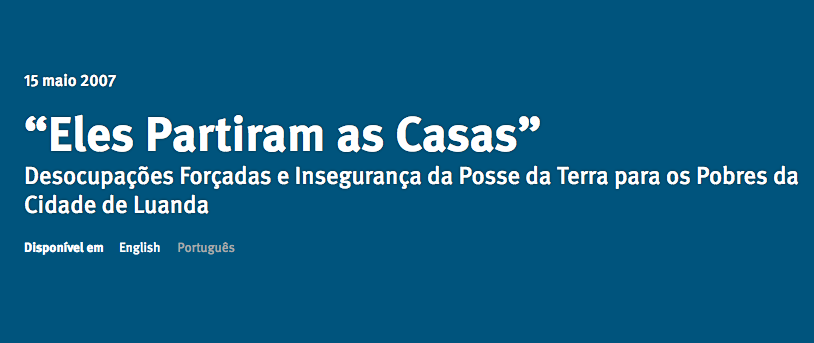Human Rights Watch is a nonprofit, nongovernmental human rights organization made up of roughly 400 staff members around the globe. Its staff consists of human rights professionals including country experts, lawyers, journalists, and academics of diverse backgrounds and nationalities. Established in 1978, Human Rights Watch is known for its accurate fact-finding, impartial reporting, effective use of media, and targeted advocacy, often in partnership with local human rights groups. Each year, Human Rights Watch publishes more than 100 reports and briefings on human rights conditions in some 90 countries, generating extensive coverage in local and international media. With the leverage this brings, Human Rights Watch meets with governments, the United Nations, regional groups like the African Union and the European Union, financial institutions, and corporations to press for changes in policy and practice that promote human rights and justice around the world.
MISSION STATEMENT
Human Rights Watch defends the rights of people worldwide. We scrupulously investigate abuses, expose the facts widely, and pressure those with power to respect rights and secure justice. Human Rights Watch is an independent, international organization that works as part of a vibrant movement to uphold human dignity and advance the cause of human rights for all.
CORE VALUES - WE ARE:
COMMITTED TO OUR MISSION OF DEFENDING HUMAN RIGHTS WORLDWIDE. Our work is guided by international human rights and humanitarian law and respect for the dignity of each human being.
INDEPENDENT. To ensure our independence, we do not accept government funds, directly or indirectly, or support from any private funder that could compromise our objectivity and independence. We do not embrace political causes, are non-partisan, and maintain neutrality in armed conflict.
FACTUAL, ACCURATE, AND ETHICAL IN OUR FACT-FINDING. We are committed to maintaining high standards of accuracy and fairness, including by seeking out multiple perspectives to develop an in- depth, analytic understanding of events. We recognize a particular responsibility for the victims and witnesses who have shared their experiences with us.
ACTIVELY FOCUSED ON IMPACT. We succeed only when our actions lead to positive and sustainable change. We are never complacent, always on the lookout for new opportunities to advance our cause. We also are committed to working on difficult situations, where long-term attention is required for meaningful impact.
SUPPORTIVE OF A DIVERSE AND VIBRANT INTERNATIONAL HUMAN RIGHTS MOVEMENT AND MUTUALLY BENEFICIAL PARTNERSHIPS. We work closely with a broad range of local and international civil society actors to maximize our impact. We speak out against attacks on civil society and defend the political space within which the broader human rights movement operates.
Members:
Resources
Displaying 11 - 15 of 20Untold Miseries - Wartime Abuses and Forced Displacement in Burma’s Kachin State
#039;When Burmese President Thein Sein took office in March 2011, he said that over 60 years of armed conflict have put Burma’s
ethnic populations through “the hell of untold miseries.” Just three months later, the Burmese armed forces resumed military
operations against the Kachin Independence Army (KIA), leading to serious abuses and a humanitarian crisis affecting tens of
thousands of ethnic Kachin civilians.
“Untold Miseries”: Wartime Abuses and Forced Displacement in Kachin State is based on over 100 interviews in Burma’s Kachin
“They Pushed Down the Houses”: Forced Evictions and Insecure Land Tenure for Luanda’s Urban Poor
Includes the context of forced evictions in Luanda; the right to adequate housing; forced evictions and demolition in Luanda; national and international responses; recommendations. Argues that a critical underlying factor was insecure land tenure, which made residents particularly vulnerable and was derived from inadequate land legislation and lack of public information about land rights and urban management policies, inadequate registration procedures, and a consequent false perception of security of tenure by residents.
“Eles Partiram as Casas”
They Came and Destroyed Our Village Again"-- The Plight of Internally Displaced Persons in Karen State
...While the nonviolent struggle of Daw Aung San Suu Kyi against the Burmese military government’s continuing repression has captured the world’s attention, the profound human rights and humanitarian crisis endured by Burma’s ethnic minority communities has largely been ignored.4
The curse of gold
This report documents human rights abuses linked to efforts to control two key gold mining areas, Mongbwalu (Ituri District) and Durba (Haut Uélé District) in the Democratic Republic of Congo (DRC).Findings of the report include:competition to control the gold mines and trading routes has spurred the bloody conflict that has gripped this area since the start of the Congolese war in 1998 and continues to the presentafter 2003 two armed groups, one backed by Uganda and the other by Rwanda, fought for the control of gold-mining areas and trade routeseach group won a gold-rich area but battles





